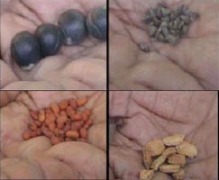Name : Madhavrao Shankarrao Patil
District & State : Jalgaon, Maharashtra
Category : Agricultural (General)
Award : Consolation
Award Function : 2nd National Grassroots Innovation Awards
Award Year : 2002
Innovation Description
 Madhavrao Patil (77 years), is an experimenting farmer. Earlier, he worked as tehsildar, in revenue office and after getting pension has devoted himself to farming fully over last two decades.
Madhavrao Patil (77 years), is an experimenting farmer. Earlier, he worked as tehsildar, in revenue office and after getting pension has devoted himself to farming fully over last two decades.
He regularly published his experiments in various newsletters and local bulletins to help other farmers. Several farmers in the region find practices disseminated by him for control of several pests quite cost-effective. He also collects seeds of good local varieties of different crops from neighboring regions. He does it, not just to improve his own productivity but also to share these seeds with others. He observes, “whenever I visit any temple or pilgrimage place, I carry seeds from my collection and distribute them free among local people there. In turn I also receive seeds of local crop varieties”. He is amazingly active at his age and remembers most of the traditional practices and names of the varieties he has in his germplasm collection.
The expertise of Madhavrao Patil ranges from agricultural pest control, disease management, herbal veterinary remedies to environmental indicators, besides of course, the germplasm collection, storage and exchange. Some of the practices chronicled by him include prevention of ergot disease and control of blister beetle in bajra (pearl millet – Pennisetum typhoides), safeguarding cotton crop from pests by interspersing it with Hibiscus canabinus, intercropping of onion with carrot for better onion-seed production, enhancing milk production by using banana and peepal leaves, and use of onion and garlic to repel insects in poultry.
Control of root parasites of Sorghum: Patil advises broadcasting carrot seeds in the field after last ploughing and sowing sorghum. Depending upon weed infestation, the rate of carrot seeds is determined. The vigorous growth of carrot depresses various weeds besides helping in controlling the root parasites. It does not seem to have any adverse effect on the yield of sorghum.
Seed exchange: He has large collection of seeds of different varieties of fruits, grains, vegetables, trees, flowers, hedge plants etc. He has built almost one person gene bank in the region and people come to him for getting seeds of new crop varieties. He has not obtained any external assistance for carrying out his on farm research.
http://nif.org.in/innovation/Traditional_knowledge_practices/190
